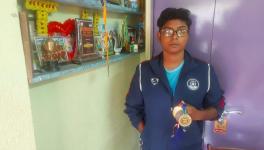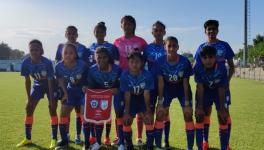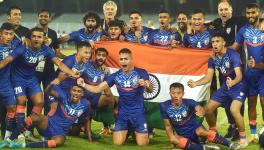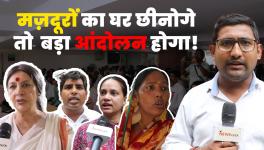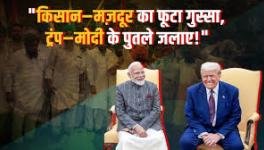Chencho Dorji: A Life in Football Dodging the Happiness Trap
Chencho Dorji’s coaching, evident during sessions at the Sudeva FC academy in New Delhi, is devoid of barked instructions and located more on the side of management via personalisation, delegation and methodology (Pics: Vaibhav Raghunandan).
“Happiness is good,” the man sitting cross legged on a bed says. The room has few personal effects to betray his interests. You later learn there is only football. On a table — packed but skillfully and cleanly organised — two books stand out. Dennis Bergkamp’s autobiography, Stillness and Speed, is one. The other one right beside it, more thumbed through, sized to fit a palm, is called No One’s Perfect. It’s by the writer Hirotada Ototake.
“Happiness also leads to satisfaction and then complacency,” the coach says. Then he laughs.
There were about 25 others with him when Chencho Dorji took the AFC C License course for coaches at Thimpu, Bhutan, in 2005. Of all present, he was the only one who had studied football all his life. Devoted, time, effort and attention to learning about a game that had captivated him throughout. Some do it via practice. Others via application. Some learn on the job. Not Chencho.
When he says study he means it. “If there was a course offered by the Bhutan Football Federation (BFF), anything to do with football… I would sign up.”
He was 25 when he took that C License course. Over the years he took courses in football, to become a coach, a goalkeeper coach, a referee even. When the BFF’s courses were done, he went to Japan and did the Japan Football Federation (JFA) license courses for coaches. If there was something that would teach him more about football, he would take it because “I always wanted to learn more from football,” before saying very precisely, “From very young I was obsessed with the game”.
So much that his parents let him be, supported him to do what he wanted in football, because they knew he wouldn’t do anything else. He shifted to Thimpu from Mongar, the place he was born and grew up in, and did these courses while making almost no money to sustain himself. He survived because the BFF figured they needed good people with single-mindedness like his.
***
“He always did his homework,” Mindu Dorji, the Deputy General Secretary at the BFF says. He remembers that course in Thimpu from 2005. At the time, Mindu was the technical director for Bhutan football. A career as a footballer — where he represented his country — had conditioned him to recognise talent. But at that level of coaching, in a programme designed to create coaches for the grassroots, talent was a tertiary skill.
Also Read | Australian Sports Federations Establish Guidelines for Inclusion of Transgender Athletes
Mindu laughs. “He did the homework and then he did some more. He was always working hard, always trying to learn. Always, learning, learning…”
It is a theme that stands out in conversations about Chencho quite clearly. Anuj Gupta, co-founder of Sudeva Delhi FC, uses different variations of that word when talking about the man he hired for an academy and has trusted enough to lead an I-League team.
“The best thing about Chencho…..” Gupta drags the thought out. “.... is that he never complains about an existing problem,” Gupta says. “He will always try and... ya toh figure it out or accept it and work with it.”
“When we sent him to be the district programme head for football in the country, we trusted him with being responsible,” Mindu says. “He had to learn to multi task. He did. He had to convince other people to work with him. He did. He had to take on not just football responsibilities, but also education responsibilities. And he did.”
For 12 years he worked for the federation as a coach at different age group levels and was part of the coaching staff for the men’s team for a while. All through, he kept expanding what he knew about football, travelling to Japan regularly to learn from the best in the continent. He was happy, but never satisfied. He was happy he could do what he was doing. Which is enough for some. Then in 2018, 13 years after starting a career as coach in the game, he poked his toe into the whirlpool of Indian football.
It was just a toe. He went to Manipur to take the job of an academy coach at FC Imphal City. It was a good job, also a comfortable job, because he knew grassroots football, knew how things worked. He knew how to work with kids. But he was also used to a certain administrative structure, a different administrative structure. When he went to Manipur he immediately realised there were things wrong, and he told the people in charge that they needed to be fixed. One year went by, and in the second year he told them he wouldn’t leave, but he wouldn’t sign on a new deal either. Not unless they fixed things. They didn’t.
A month later he joined a club in Delhi, another toe in; ready to make some history.
***
If you have seen the 2003 film, The Other Final, you are familiar with the romance of Bhutanese football, the underdog doggedness of it, the silent nonchalance and the ache for professionalism. It is a funnily told heartwarming tale, equal bit annoying and endearing. If you haven’t, grab some popcorn and click here.
The annoying bits are tough to ignore though. More to do with a lack of information, than anything else. The Bhutan Football Federation only aligned itself with FIFA three years before the film was released (two when the match it talks about took place). An important detail to consider, seeing as important FIFA (and its funding generosity) is to the sport globally. It is also important because it helped you understand why the country was at the bottom of the rankings in the first place. They had spent two years on the FIFA table, and hadn’t accumulated enough games, that's why.
In the 18 years since that film (pause here to realise that yes, it has been 18 years since Ronaldo turned up with that haircut in a World Cup final) Bhutan has worked hard at its football. Those balding pitches are a thing of the past. And so is the aching desire for professionalism. Bhutan’s league may be small and nondescript, barely registering on the Asian football radar, but their grassroots programme’s long-term vision is remarkable.
So remarkable that its blueprint includes a coach training programme to run alongside a grassroots programme for aspiring footballers. In 2005, the course Chencho signed up for was the first of its kind in the country. Now, according to their official website (and Dorji himself) the country has over 100 C License coaches, 30 B License coaches, 10 A License coaches and one coach with an AFC Pro License.
Also Read | Boys Interrupted: Shivam Mavi, Kamlesh Nagarkoti and the Tough Road to the Top
Their long-term partnership with the JFA also means that they have frequent exchange trips organised for coaches in training. Despite the lack of a long league season or a sustained and coherent international fixture plan, these coaches are occupied. At the grassroots. A huge number of them are delegated to scout, train and equip talent across the country before being called up to the two academies run by the BFF — the boy’s academy is in Thimpu and the one for girls in Gelephu. Chencho served at the boy’s academy for over a decade (in various roles) before coming to India.
***
“You have to make some sacrifices if you want to be a coach,” the man who shifted away from home, a wife and a child to coach a club in Delhi says. At the start of the lockdown, when countries were pulling their citizens out to take them home, Bhutan (who have registered a total of 282 positive cases since March) was running a flight to Thimpu every few days from Delhi. Chencho was asked if he would like to go home. He refused each time, choosing instead to stay with the kids he had taken charge of. India has had 63 lakh Covid cases in the last seven months. They added 86,821 in the last 24 hours. Why stay? What madness is this?
Jigme Norbu, the Bhutan national team director, says it best when he says that Chencho “has an unwavering focus. He is committed to an extreme.”
“Think about this. He’s a coach from Bhutan,” Sudeva Delhi’s co-founder Vijay Hakari says. “And he has experienced the coaching culture in Japan. And now he's at a football club in Delhi. There is a drastic shift in attitude he has to adapt to. And he’s done it seamlessly.”
“He isn’t the stereotype, screaming, shouting, being visually assertive,” Hakari says. “He is disciplined, very focussed on discipline, very focussed on the process. And the system. He gives and takes from it.”
“We trusted him with the academy at a time when we couldn’t physically be there {at the peak of the pandemic). The way he worked to ensure everything was fine, calmed the parents, kept the kids disciplined it was all great to see. Rather than adopting the attitude of ‘working for us’, he worked with us and that solidified our trust in him”.
***
“To a certain extent I agree with the idea that good coaches come from countries with better football development,” Mindu says. “But,” he adds emphatically , “it doesn’t need to be the absolute truth.
“Coaches in different countries face different situations and that tunes them to problem solve. They can do that anywhere with slight tweaks to adjust for culture. Anyway, I think you’ll find out what I mean, when you see Chencho’s coaching.”
Chencho’s coaching then. It is devoid of the overdone physical act of hand movement. It is devoid also of loudly barked instructions. It is located more on the side of management via personalisation, delegation and methodology. At a training session he calls the physio in to conduct it. Because he wants every member of the team invested in the sport the way he is. And equipped too.
Also Read | IPL and the Case of the Missing Indian Coach
“What I want to do in the game is learn from it as much as I can. You can learn from everyone. And in turn everyone can learn from others. It will always benefit,” he says.
At the trials being conducted at the club for the I-League team, Chencho is involved full time. He sits with a file and pen, dressed in kit, on the job. After every session he talks to the trialists and coaches them on what they did wrong. He talks to them and explains what he actually expects them to do. He has no obligation to do this. He is there to select not instruct. But instruction is natural. Because for a learner, teaching is natural.
***
Hirotada Ototake’s No One’s Perfect is an autobiography, the story of a man born without limbs because of a genetic disorder called the tetra-amelia syndrome. The book on Chencho’s working desk is an English translation. Ototake is a friend, and Chencho finds the book to be therapy when he faces questions he needs answered. And for a first time coach in the I-League there will be many.
For those questions though, Chencho doesn’t need the book. Sudeva’s ambition — and by association Chencho’s too — isn’t result oriented. It’s more about ensuring and creating a smooth transition for an academy club to become one in the 2nd division of the country.
There is a strange season coming up. A season set to be played at a single venue with players quarantined in biosecure facilities, locked in, zoned in, with only football to play. Strange things anyway happen in the I-league.
Ever since the 2016-17 season when Aizawl broke the glass ceiling, only strange things have happened. The season after Minerva won the title, playing conservative smart football. The one after Chennai City did, playing like a team possessed, buoyed by their Spanish contingent. Go further back and you find Bengaluru FC in 2013-14, winning the title in a debut season. The season after that, there was Royal Wahingdoh doing some strange stuff in strange ways, refusing to defend but also refusing to stop scoring. Or just go back to last season when the clubs ranked second through eighth were separated by three points. Strange things happen in the I-League.
What does he want to happen? “Obviously I will say I want to win the league”. Who doesn’t. Which coach wouldn’t say that. “But more than anything I want everyone to learn. The boys in the academy learn from watching the I-League, the team there getting experience and exposure. We have to be realistic also. I cannot stress about if we win or lose, or be overwhelmed by the results. If we lose, we learn and move on. Get better in the next game.”
So then, what happens when you win?
“You can’t get too happy. Because getting too happy is a problem,” comes the final Chenchoism. “You have to always control. Don’t get too sad. Don’t get too happy.” Always keep learning.
Get the latest reports & analysis with people's perspective on Protests, movements & deep analytical videos, discussions of the current affairs in your Telegram app. Subscribe to NewsClick's Telegram channel & get Real-Time updates on stories, as they get published on our website.









